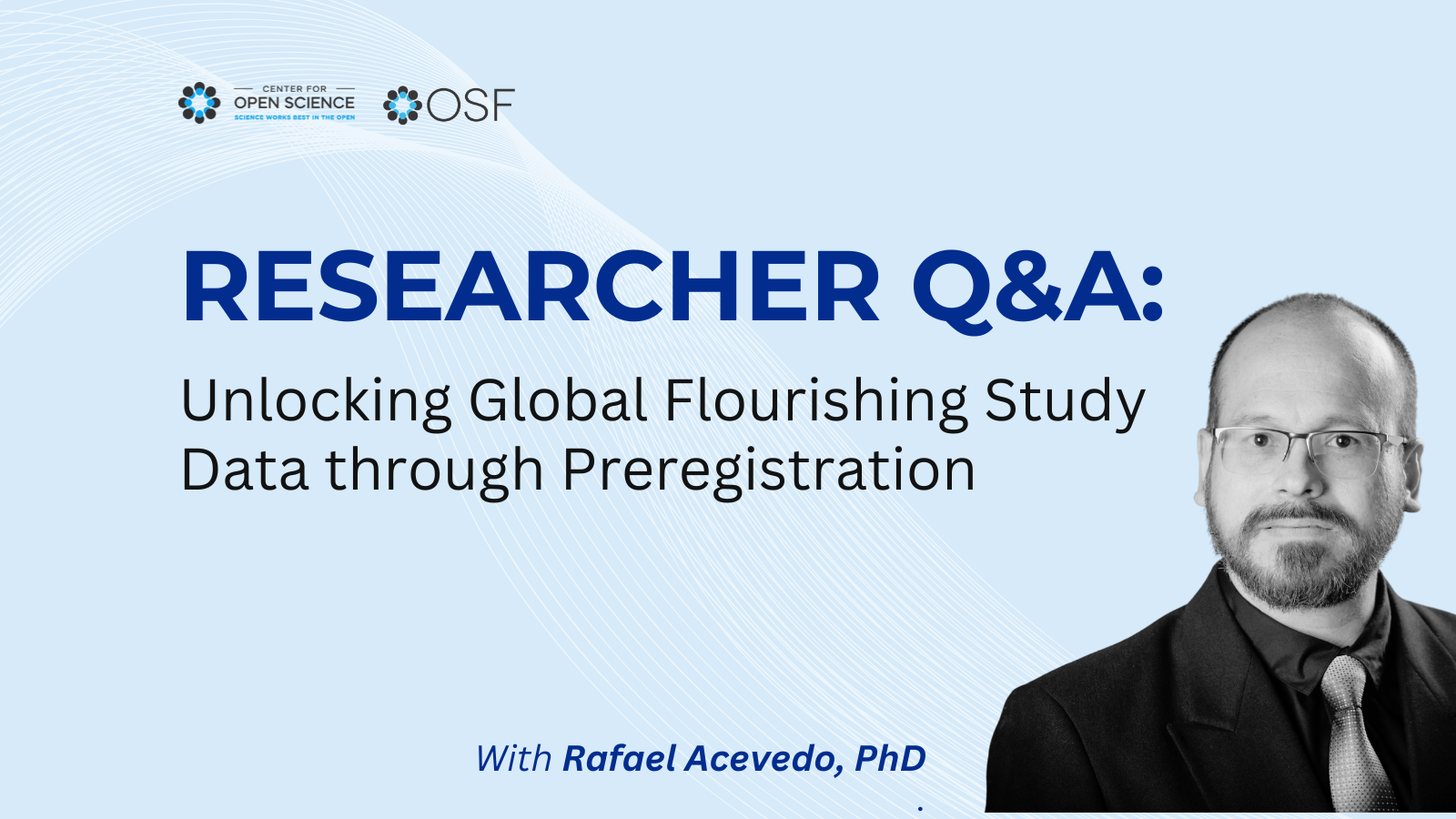
The Global Flourishing Study (GFS) is a landmark longitudinal study led by Harvard University’s Human Flourishing Program and Baylor University’s Institute for Studies of Religion, in collaboration with Gallup and COS. The study has collected comprehensive data from approximately 200,000 participants across 22 culturally and geographically diverse regions.
Beginning with the second wave of data, the GFS data will be made available, without restriction, one year after each wave’s data collection. Researchers can also gain earlier access by submitting a preregistration—a practice that promotes transparency and reduces the risk of selective reporting during initial data exploration.
All GFS data will ultimately become fully open access, ensuring its continued value as a global resource for researchers, journalists, policymakers, and educators. The data itself will be hosted on the Open Science Framework (OSF), a free and open source platform maintained by COS.
Dr. Rafael Acevedo, whose work explores economic freedom, growth, and development in global contexts, is among the researchers already drawing on the rich GFS dataset. In this Q&A, he shares how access to GFS data enhances his research, and how the OSF supports increased research visibility, collaboration, and connection with a broader scholarly community.
Dr. Acevedo serves as Program Manager at the Menard Family Center for Economic Inquiry at Creighton University, where he oversees programming and student engagement initiatives. Originally from Venezuela, he was a tenured professor and researcher at Universidad Centroccidental Lisandro Alvarado. In addition to his administrative role at Creighton, he teaches economics as an Adjunct Instructor at the University of Illinois Springfield and Western New Mexico University.
Q: Can you tell us about the research you’re currently working on?
A: I am measuring the effect of economic freedom, and some cultural practices, such as alcohol consumption levels and religious service attendance, on human flourishing. The first working paper is already uploaded on the OSF; however (spoiler...), I’ve continued working on this project, and I have advanced in the research and found more robust and consistent results. This latest paper is still in revision, and I hope to submit it to a journal before the Fall semester starts—and update my OSF preregistration project accordingly.
Q: How are you hoping to utilize/apply the data from GFS to this work?
A: Following the VanderWeele Secure Flourishing Index (2017), I built an index using Principal Component Factor Analysis (PCF). Also, I followed Weziak-Bialowolska (2021) and created an extended human flourishing index using 36 questions and PCF. I am using other sources of data as well, including the World Bank, V-Democracy, the Fraser Institute, and the Heritage Foundation.
In this first stage of my research, I have conducted a cross-sectional analysis. The results are very interesting and evidence a significant and positive relationship with economic freedom, but also the importance of socializing.
Q: What interests you most about the GFS, and how did you first become aware of this study?
A: I am highly interested in continuing this line of research and testing the early results I have obtained with Wave 1. I would like to have the opportunity to increase my dataset with Wave 2, 3, and beyond in order to create a data panel and increase statistical power.
I became aware of this study in a completely different context than research. Economic Freedom has been my field of interest from some years ago, but I learned about the GFS because there was a job position opening in the Human Flourishing Program, and I decided to apply. To apply for a job, you do some research about the mission of the organization and the work that is done, and I found the project very interesting and related to the research of many people in my network. Before this, I hadn't worked on Human Flourishing directly because I had always considered it to be a more philosophical and theoretical field. But having a dataset that allows us to create flourishing indices under different definitions encouraged me to actively work and pursue research in this area.
Q: Can you share why open science practices like preregistration are important in your research activity?
A: I think that it gives researchers the opportunity to be recognized for what they are doing. It also could help you connect with other researchers who are interested in your work and similar topics, and to be updated on newly available dataset, literature, and research advances. I believe that any opportunity to increase your research network is important and should be taken.
Are you a researcher interested in exploring datasets from the Global Flourishing Study? Learn more about how to access GFS data.

6218 Georgia Avenue NW, Suite #1, Unit 3189
Washington, DC 20011
Email: contact@cos.io

Unless otherwise noted, this site is licensed under a Creative Commons Attribution 4.0 International (CC BY 4.0) License.
Responsible stewards of your support
COS has earned top recognition from Charity Navigator and Candid (formerly GuideStar) for our financial transparency and accountability to our mission. COS and the OSF were also awarded SOC2 accreditation in 2023 after an independent assessment of our security and procedures by the American Institute of CPAs (AICPA).
We invite all of our sponsors, partners, and members of the community to learn more about how our organization operates, our impact, our financial performance, and our nonprofit status.